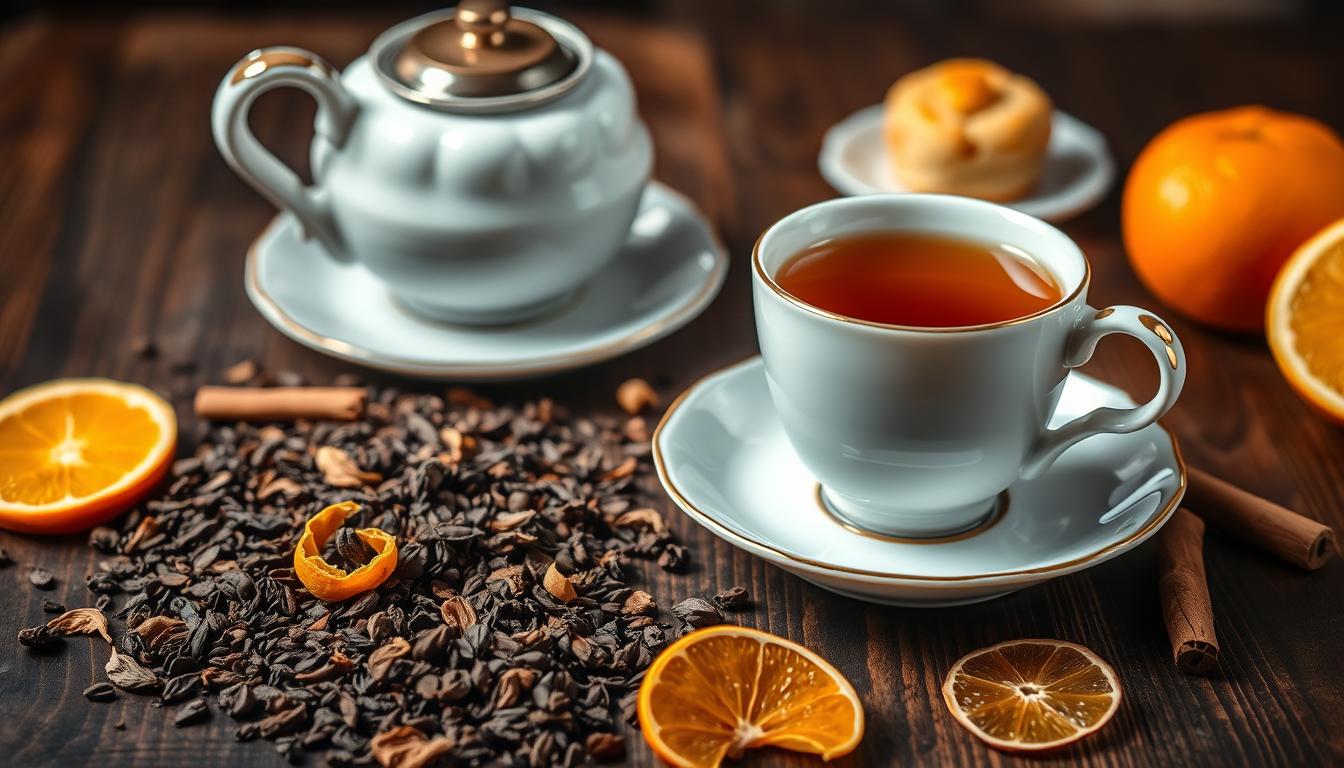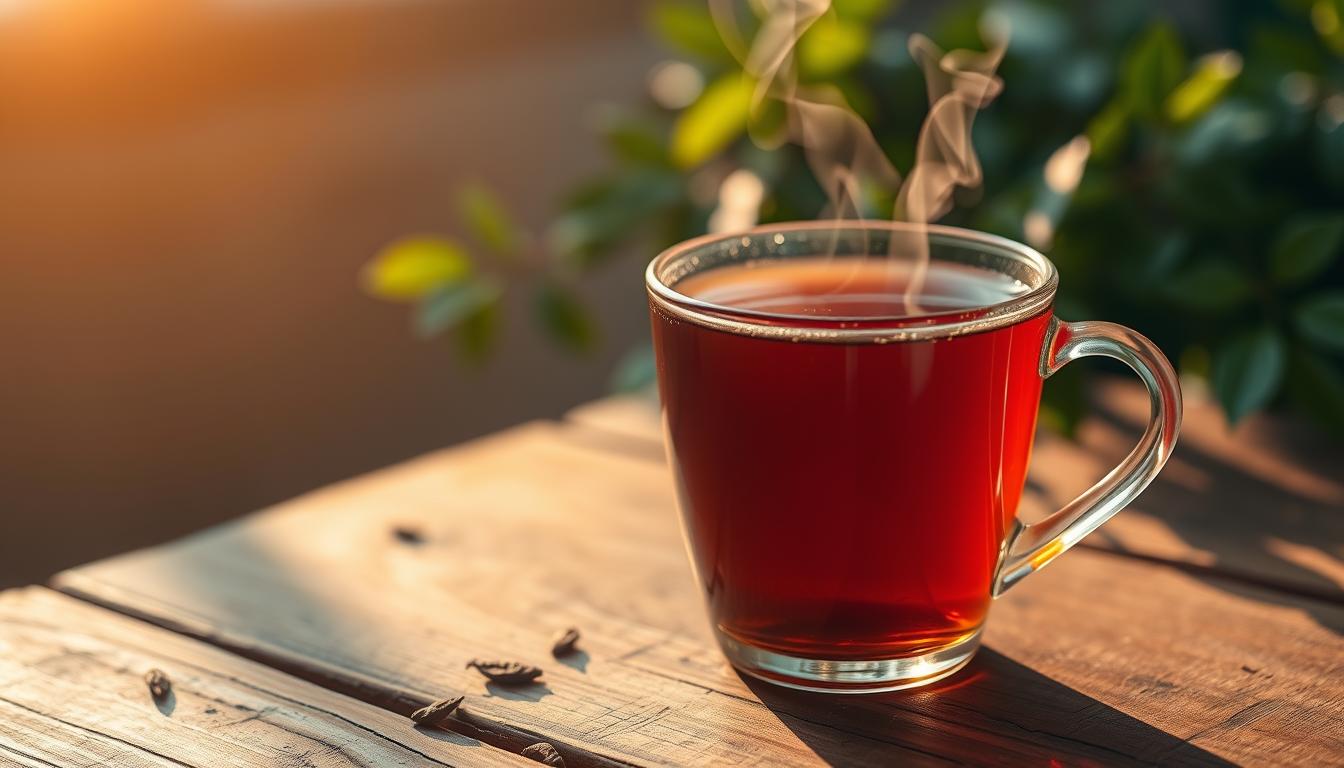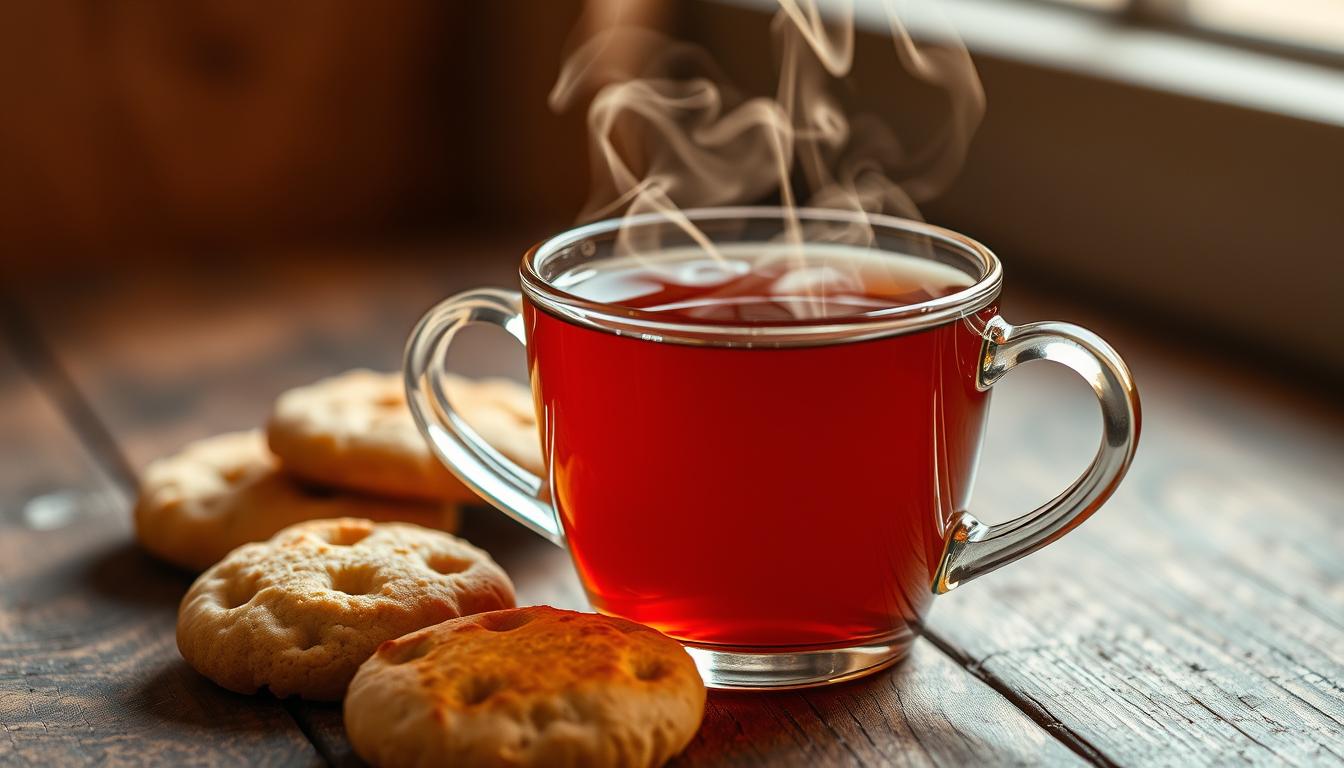Did you know a single cup of English Breakfast Tea contains about 42 mg of caffeine? This robust black tea blend is a morning favorite worldwide, offering a gentle energy boost to start the day. Its rich flavor and invigorating qualities make it a popular choice for those seeking an alternative to coffee.
English Breakfast Tea is a classic blend of black teas, known for its bold taste and smooth finish. Its caffeine content is lower than coffee but enough to provide a refreshing lift. The brewing process, including steeping time, can influence both the flavor and caffeine levels, making it a versatile beverage.
Whether you enjoy it plain or with a splash of milk, this tea blend is perfect for mornings or anytime you need a mild pick-me-up. Stay tuned as we explore its origins, variations, and brewing tips in the sections ahead.
Key Takeaways
- English Breakfast Tea contains approximately 42 mg of caffeine per cup.
- It’s a blend of black teas known for its bold flavor and smooth finish.
- Brewing techniques, like steeping time, affect both taste and caffeine levels.
- This tea offers a mild energy boost, making it a great morning beverage.
- It’s a popular alternative to coffee for those seeking a gentler lift.
Exploring the Roots and Flavor of English Breakfast Tea
With roots in India and Kenya, English Breakfast Tea offers a unique taste. This iconic blend has become a morning favorite, known for its rich history and robust flavor. Its journey from traditional tea gardens to your cup is a story worth savoring.

A Brief History and Origins
English Breakfast Tea traces its origins to the 19th century. It was crafted by blending strong black teas from Assam, India, and Kenyan tea leaves. These regions are renowned for their high-quality leaves, which contribute to the blend’s malty and balanced profile.
The tea gained popularity in England and soon became a staple in households worldwide. Its ability to pair perfectly with breakfast earned it the name we know today. Over time, the blend has evolved, but its core ingredients remain unchanged.
Understanding Its Unique Blend and Flavor Profile
The combination of Assam and Kenyan leaves creates a distinct flavor. Assam tea brings a bold, malty taste, while Kenyan leaves add brightness and depth. Together, they form a smooth and satisfying cup that’s perfect for mornings.
This blend’s robust flavor makes it an excellent alternative to coffee. It provides a gentle energy boost without overwhelming the palate. Whether enjoyed plain or with milk, it’s a versatile beverage that suits any time of day.
Variations like decaf or flavored options are also available. These tweaks can alter the taste and caffeine content, offering something for everyone. No matter the version, the essence of this classic tea remains intact.
- Origins: Assam and Kenyan leaves form the foundation of this blend.
- Flavor: Malty, bold, and smooth, it’s a morning favorite.
- Versatility: Enjoy it plain, with milk, or in decaf versions.
does english breakfast tea have caffeine
Curious about the caffeine in your morning brew? Let’s dive into the details. A standard 8-ounce cup of black tea, like English Breakfast, contains about 42 mg of caffeine. This amount provides a gentle lift, perfect for starting your day.

Caffeine Content in a Standard Cup
The caffeine content in black tea varies based on preparation. For example, steeping for one minute yields around 14 mg, while a five-minute steep can reach 42 mg. This flexibility allows you to control the strength of your drink.
Factors That Influence Caffeine Levels
Several factors affect caffeine extraction. Steeping time is the most significant—longer steeps release more caffeine. Water temperature also plays a role; hotter water extracts caffeine faster. Additionally, loose leaf tea often contains more caffeine than tea bags.
For those sensitive to caffeine, shorter steeping times can create a milder beverage. Experimenting with these factors can help you find the perfect balance for your taste and energy needs.
Comparing English Breakfast Tea with Other Morning Beverages
Morning beverages vary widely in caffeine content and flavor profiles. From robust coffee to soothing chai, each drink offers a unique experience. Understanding these differences can help you choose the perfect pick-me-up for your day.
Coffee vs. Black Tea: A Caffeine Showdown
When it comes to caffeine, coffee takes the lead. An 8-ounce cup of coffee typically contains around 95 mg, while black tea offers about 42 mg. This makes black tea a gentler option for those seeking a milder energy boost.
Flavor also sets these drinks apart. Coffee is bold and intense, while black tea provides a smooth, malty taste. Both are excellent choices, but your preference depends on your desired strength and taste.
Green Tea and Chai: Caffeine Differences and Brewing Tips
Green tea contains less caffeine than black tea, averaging 25 mg per cup. Its light, grassy flavor makes it a refreshing alternative. Chai, on the other hand, combines black tea with spices, offering a unique taste and a moderate caffeine kick.
Brewing methods play a key role in flavor and caffeine levels. For green tea, use water at 175°F and steep for 2-3 minutes. Chai benefits from a longer steep, around 5 minutes, to fully release its spices and caffeine.
Brewing Methods: How Steeping Time Alters the Boost
Steeping time significantly impacts caffeine extraction. A shorter steep yields a milder drink, while a longer steep increases caffeine content. For black tea, 3-5 minutes is ideal, balancing flavor and energy.
Water temperature also matters. Hotter water extracts caffeine faster, but cooler water preserves delicate flavors. Experimenting with these factors can help you find your perfect brew.
- Coffee: Higher caffeine content (95 mg per cup) with a bold flavor.
- Black Tea: Moderate caffeine (42 mg) and a smooth, malty taste.
- Green Tea: Lower caffeine (25 mg) and a light, refreshing profile.
- Chai: Spiced blend with moderate caffeine and a unique flavor.
Conclusion
Exploring the world of black tea reveals the charm of English Breakfast. This classic blend, with its rich history and robust flavor, offers a delightful start to your day. A standard cup provides a modest boost, making it a perfect alternative to coffee.
Originating from Assam and Kenyan leaves, this tea blend combines malty depth with a smooth finish. Its caffeine content can be adjusted by tweaking steeping time, allowing you to customize your drink. Whether you prefer it plain or with milk, it’s a versatile choice for any morning.
Compared to other beverages, this black tea stands out for its balanced taste and moderate caffeine. Experiment with brewing techniques to find your ideal cup. Dive into the variety of tea options and enjoy the journey of discovering your perfect blend.

